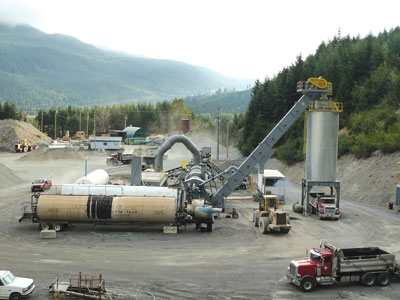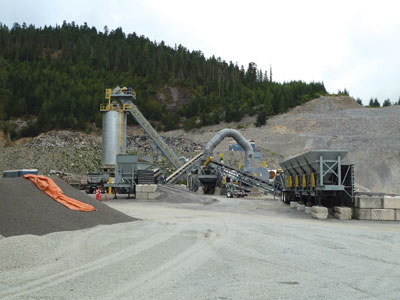
Features
Company Profiles
Roads & Paving
Whistler Paving Woes
Town excludes local company from tender process.
October 12, 2012 By Andrew Macklin
In 1989, there didn’t seem to be a reason to pursue it further.
In 1989, there didn’t seem to be a reason to pursue it further. Frank Silveri of Alpine Paving, a subsidiary of Whistler Aggregates, had just paid the $750 requested for the cost of a bylaw application to run his paving plant on the outskirts of Whistler, B.C. The existing bylaw stated that the zoning for the property was for manufacturing and, according to the then-city solicitor, a paving plant qualified as manufacturing, and so there was no need for a new bylaw.
 |
|
| Environmental buffers that prevent the spread of fumes to the neighbourhoods nearby surround most of Silveri’s paving plant.
|
Fast forward 23 years, and Frank Silveri finds himself in the centre of a controversy that has cost his company hundreds of thousands of dollars despite operating within the laws set out by both the municipal and provincial governments.
In 2004, Silveri was notified that the Sabre Transport Ltd. property was going up for sale, which included a gravel pit operation. Around the same time, the Resort Municipality of Whistler (RMOW) announced that, at a site less than one kilometre away, an athletes village was being built for the 2010 Winter Olympics. Doing due diligence in order to ensure that his operation wouldn’t be shut down as a result of the new village, Silveri once again approached the municipality to discuss his location.
“I wanted to make sure that, if I bought this property and began operating out of it, they weren’t going to shut me down after the Games were over,” said Silveri. “The municipality assured that wouldn’t happen, and it was OK to purchase the property.”
Then, five years later in 2009, Silveri was approached by the province and asked for a favour: expand your gravel operation to the south, leaving a piece of property on the north end that would act as a buffer between your operation and the athletes village. The overall site size would remain the same. Silveri was willing to make the necessary land swap with the Province and the RMOW, so long as the bylaw for the new piece of land would be zoned to allow for gravel extraction and the production of asphalt.
But 20+ years after the initial bylaw had been adopted, new municipal staff and local politicians were in place, and had a much different interpretation of the zoning bylaw. This time municipal officials, both staff and politicians, saw the bylaw as a clear statement that Whistler Aggregates Ltd. was operating illegally based on the current zoning.
Following the Olympics when new homeowners began moving on to the site, the issue gained the support of the new residents, who were not prepared to live with the smell, traffic and noise that the plant created, although they had signed a disclaimer to that effect, in their sales agreement, notifying them that there was an operating quarry and asphalt plant in the neighbourhood and that they should expect noise, dust, smell and truck traffic.
In April of 2011, Whistler officials presented a cease and desist order to Silveri, who continued to operate the asphalt plant as he fought the bylaw issue in B.C. Supreme Court. On Jan. 31, 2012, Justice Kloegman delivered a seven-page decision in favour of Whistler Aggregates Ltd. According to the judgment:
“After a careful review of the documents and case law provided to me, I find that I am in agreement with the respondent’s position that on a true construction of Zoning Bylaw No. 412, 1984, adopted October 15, 1984 (the “Bylaw”), the manufacture and processing of gravel and aggregate into asphalt on the property zoned IP1 is permitted. Thus, there is no breach of the Bylaw by the respondent, and no basis for granting the injunction to the petitioner.”
 |
|
| A natural berm serves as a buffer between the paving plant and the Cheakamus neighbourhood, which has been at the centre of the controversy surrounding Silveri’s property.
|
With nearly $600,000 already spent battling Silveri both inside and outside the courtroom, the RMOW decided not to appeal the ruling from Justice Kloegman. Silveri, it seemed, was finally going to be able to go about his business without further headaches caused by local government officials.
But the 2012 tendering process revealed a different story. In the tender for roadwork, it was stated that asphalt for roadwork had to come from an asphalt plant that was at least three kilometres from any RMOW neighbourhood.
“That makes my Whistler plant ineligible,” said Silveri. “I said, ‘this is unfair, I’m being targeted.’ I told them it was discriminatory, but they said that they were levelling the playing field.”
Ironically, Silveri was still able to get the contract using his plant in Squamish, 50-60 kilometres away, but Silveri offered a $55,000 cost savings if they would allow for the asphalt to be produced at his Whistler location. According to a July 26, 2012, article in the Whistler Question, RMOW Mayor Nancy Wilhelm-Morden said the extra money was worth spending. (It should be noted here that the current mayor was a councillor for the RMOW in 1997 when the RMOW asked Silveri to move his asphalt plant to its current location.)
“We have done a bit of a cost-benefit analysis,” she said. “This is so that we can avoid the cost to the Cheakamus Crossing neighbourhood of the nuisance and air quality with the operation of that plant.”
The RMOW’s introduction of a tender qualification that is “best for the community” could potentially resonate in our communities across Canada that are not prepared to tolerate the inconveniences that come with the day-to-day operations of asphalt plants and aggregate operations. That possibility is of great concern to both Silveri and the B.C. Stone, Sand and Gravel Association. Both parties have begun exploring whom they can speak to within the provincial government to ensure that such adjustments to the municipal tendering process are not allowed.
“We are trying to get some advice from the provincial government on how to move forward,” said Silveri. “This has never happened before, so we are not sure who we need to be talking to.”
Ultimately, Silveri looks to his community to support his ability to move forward with his business, which has operated in the community for parts of four decades.
“You have to hope that, eventually, the people of Whistler will get ticked off at how much of their money has been wasted on this.”
Print this page